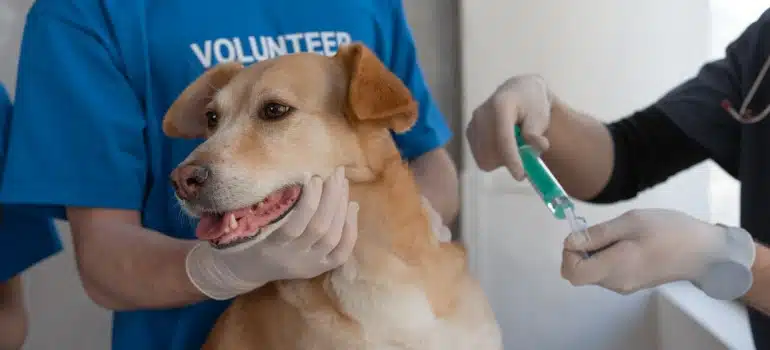A guide to Florida rules and regulations for pet moves
Apartment life in Florida often means bringing pets along when you relocate. While the state welcomes pets, it has rules to protect both animals and the public. Each pet needs the right paperwork, vaccinations, and care during travel. Some counties add extra rules for licensing and leash laws. Florida also has unique restrictions on certain exotic pets and dangerous animals. This Pro Movers Miami guide to Florida rules and regulations for pet moves explains what you need to know before travel, during transport, and after arrival.
Know the statewide basics
Florida requires a Certificate of Veterinary Inspection for dogs, cats, and ferrets entering the state. A licensed veterinarian issues this certificate, usually within 30 days of travel. Pets also need proof of a current rabies vaccination. For dogs and cats, this is non-negotiable. Ferrets also fall under this rule.
Microchipping is not legally required but highly recommended. ID tags with your name and phone number help in case of loss. Carry recent medical records to show vaccination dates and treatments. Florida law also sets expectations for humane transport. Pets must travel in safe conditions, with access to air and protection from extreme heat.

County and city rules change details
After you arrive in Florida, county and city rules take over. Each county sets its own pet licensing system. Deadlines for registration differ, so check local animal services websites. Many cities enforce leash laws in public spaces, and fines can apply for violations.
Condominium boards and homeowner associations often have their own bylaws. These may restrict the number of pets per unit, set weight limits, or regulate breeds. Before signing a lease or buying property, review the community’s rules. Following local guidelines and working with white glove moving services prevents conflicts with neighbors and avoids penalties.
Species-specific regulations
Florida applies different rules for different animals. Dogs and cats must be vaccinated against rabies once they reach the required age. Boosters are needed based on vaccine type, usually one to three years. Rabies tags must be worn on collars.
Birds often require a health certificate before travel, especially parrots, due to disease concerns like Psittacosis. Reptiles and amphibians fall under the Florida Fish and Wildlife Conservation Commission (FWC). Some reptiles, such as Burmese pythons, are banned. Conditional species may need permits.
Small mammals like rabbits and guinea pigs have fewer restrictions but still need safe housing and transport. Fish and aquatic pets must not include invasive species, which can carry heavy penalties if released.
Restricted, prohibited, and dangerous classifications
The FWC keeps a detailed list of restricted or prohibited species. Examples include certain large reptiles and non-native mammals. Possessing these without permits can lead to confiscation and fines.
Local governments may also classify certain dogs as “dangerous.” If your dog has a history of attacks, extra rules may apply. These can include insurance requirements, secure enclosures, and signage. Ignoring these rules may result in penalties or the forced surrender of the animal.
Air travel into and within Florida
If you fly into Florida with a pet, airlines require documents. Most ask for a recent health certificate and proof of rabies vaccination. Carriers must fit airline size limits and allow the pet to stand and turn. Florida airports may also enforce heat restrictions in summer months, limiting cargo travel during high temperatures.
Service animals are recognized under federal law, while emotional support animals face stricter airline limits. Decide early whether your pet will fly in-cabin or cargo. Upon arrival, airline staff may review documents before releasing your pet.
Driving to Florida with pets
Many people bring pets to Florida by car. You must carry a valid health certificate and vaccination records when crossing state lines. Pets should be restrained with a harness, crate, or divider. Leaving pets alone in cars during Florida’s heat is illegal and dangerous.
Plan rest stops where pets can relieve themselves safely. Carry cleaning supplies to manage waste and avoid fines. Pack enough food, water, and any medications for the trip. Safe driving with pets means planning for comfort and security.

International moves to Florida
International pet moves require more steps. The USDA and APHIS oversee paperwork for animals entering from abroad. Pets need microchips that meet international standards. Rabies vaccines must match U.S. requirements, and some countries impose waiting periods before travel.
On arrival, pets may undergo customs inspection. Officers check documents, vaccination proof, and carrier conditions. Fees can apply at the port of entry. To avoid delays, work with a vet familiar with Florida rules and regulations for pet moves, export, and import requirements.
After you arrive: registrations and first-week tasks
Once in Florida, apply for a county pet license. You will need proof of rabies vaccination and sometimes a microchip number. Schedule a vet visit to establish care in your new area while local movers in Florida handle your belongings. Transfer any prescriptions to a local pharmacy.
Update your pet’s microchip registration with your new address and phone number. Review pet insurance policies and adjust coverage if needed. It also helps to locate the nearest 24/7 veterinary clinic. For recreation, check which beaches and parks allow pets and whether permits are required.
Health, safety, and wildlife risks in Florida
Florida’s climate brings health risks. Heatstroke is common, so walk pets early or late in the day. Use parasite prevention year-round for heartworm, fleas, and ticks. Your vet will recommend the right plan.
Wildlife encounters are another concern. Alligators, snakes, and coyotes live near many residential areas. Always keep pets leashed near water and wooded areas. During hurricane season, prepare a go-bag for pets and identify pet-friendly shelters in advance.
Timeline and document checklist
A simple timeline helps keep pet moves on track. Breaking tasks into steps makes the process easier and prevents last-minute problems:
- 60–45 days out: Confirm legality of your pet, book vet visit.
- 30 days out: Secure health certificate, update vaccines.
- 2 weeks out: Buy a carrier and add contact labels.
- 1 week out: Pack medications, records, and pet photos.
- Move day: Bring water, snacks, and leashes.
- First week in Florida: Get local license, schedule new vet exam.
With this checklist, you can avoid missed deadlines, skipped vaccines, or delays at checkpoints.
Costs, fines, and how enforcement works
Expect costs for veterinary exams, health certificates, licensing, and microchipping. Each county sets license fees, usually between $10 and $45 per year. Fines apply if pets lack rabies tags, run off-leash, or belong to banned species. Enforcement often occurs during airport inspections, animal control checks, or after neighbor complaints. Staying compliant is cheaper and less stressful than paying penalties.

Quick resources and where to verify rules
Finding accurate information can be difficult since regulations vary by species, county, and even type of transport. These official sources provide the most reliable updates:
- Florida Fish and Wildlife Conservation Commission (FWC): Species lists, permits, and prohibited animals.
- County animal services: Local licensing deadlines, leash laws, and registration rules.
- USDA and APHIS: Interstate and international health certificate requirements.
- Airline websites: Pet carrier size rules, seasonal embargoes, and documentation policies.
Regulations change often, so checking these resources before each move keeps you compliant and avoids costly surprises.
How to prepare your pet for a compliant move
Moving pets to Florida requires preparation, but the process is manageable with the right steps. Confirm your pet is legal, collect documents, and plan safe travel for you and them while long-distance movers in Florida move your belongings. After arrival, follow county licensing rules and schedule a vet visit.
Keep a folder with both digital and paper copies of all records. Staying compliant protects your pet and avoids fines. Use the checklist and resources here as your guide to Florida rules and regulations for pet moves, and your relocation will go much more smoothly.
